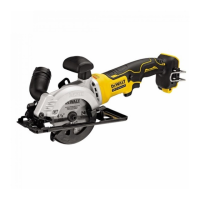ENGLISH
13
is exposed until this occurs. Never reach under the work for
any reason. When you have to retract the lower blade guard
manually (as is necessary for starting pocket cuts), always
use the retractinglever.
WARNING: When cutting thin strips, be careful to
ensure that small cutoff pieces don’t hang up on the
inside of the lower bladeguard.
Ripping
Ripping is the process of cutting wider boards into narrower
strips – cutting grain lengthwise. Hand guiding is more
difficult for this type of sawing and the use of a
rip
fence isrecommended.
Installing the Rip Fence (Fig, A, Q)
You can install a rip fence on your circular saw by loosening
the rip fence locking screw
27
with the included blade
wrench
14
and inserting the rip fence as shown in
FigureQ. When the rip fence is at the desired position, use
the blade wrench to tighten the rip fence locking screw,
locking it inplace.
INSTALL RIP FENCE
IN THIS DIRECTION
Fig. Q
27
Pocket Cutting (Fig. R)
WARNING: Never tie the lower blade guard in a raised
position. Never move the saw backwards when pocket
cutting. This may cause the saw to raise up off the
work surface, which could causeinjury.
Fig. R
A pocket cut is one that is made in a floor, wall or other
flatsurface.
1. Adjust the saw shoe so the blade cuts at desireddepth.
2. Tilt the saw forward and rest front of the shoe on
material to becut.
3. Using the lower blade guard retracting lever, retract the
lower blade guard to an upward position. Lower the
rear of the shoe until the blade teeth almost touch the
cuttingline.
4. Release the lower blade guard (its contact with the work
will keep it in position to open freely as you start the
cut). Remove your hand from the lower blade guard
retracting lever and firmly grip the auxiliary handle, as
shown in FigureR. Position your body and arm to allow
you to resist kickback if itoccurs.
5. Make sure blade is not in contact with cutting surface
before startingsaw.
6. Start the motor and gradually lower the saw until its
shoe rests flat on the material to be cut. Advance saw
along the cutting line until cut iscompleted.
7. Release the trigger switch and allow the blade to
stop completely before withdrawing the blade from
thematerial.
8. When starting each new cut, repeat the abovesteps.
MAINTENANCE
WARNING: To reduce the risk of serious personal
injury, turn unit off and remove the battery pack
before making any adjustments or removing/
installing attachments or accessories. An
accidental start-up can causeinjury.
Cleaning
WARNING: Blow dirt and dust out of the guarding
system and all air vents with clean, dry air at least
once a week. To minimize the risk of eye injury, always
wear ANSI Z87.1 approved eye protection when
performingthisprocedure.
WARNING: Never use solvents or other harsh
chemicals for cleaning the non-metallic parts of
the tool. These chemicals may weaken the plastic
materials used in these parts. Use a cloth dampened
only with water and mild soap. Never let any liquid
get inside the tool; never immerse any part of the tool
into aliquid.
Accessories
WARNING: Since accessories, other than those
offered by
, have not been tested with this
product, use of such accessories with this tool could be
hazardous. To reduce the risk of injury, only
recommended accessories should be used with
thisproduct.
Recommended accessories for use with your tool
are available at extra cost from your local dealer or
authorized service center. If you need assistance in
locating any accessory, please contact
Industrial
Tool Co., 701East Joppa Road, Towson, MD 21286, call
1-800-4-
(1-800-433-9258) or visit our website:
www.dewalt.com.
Repairs
The charger and battery pack are notserviceable.
WARNING: To assure product SAFETY and
RELIABILITY, repairs, maintenance and adjustment
(including brush inspection and replacement, when
applicable) should be performed by a
factory
service center or a
authorized service center.
Always use identical replacementparts.

